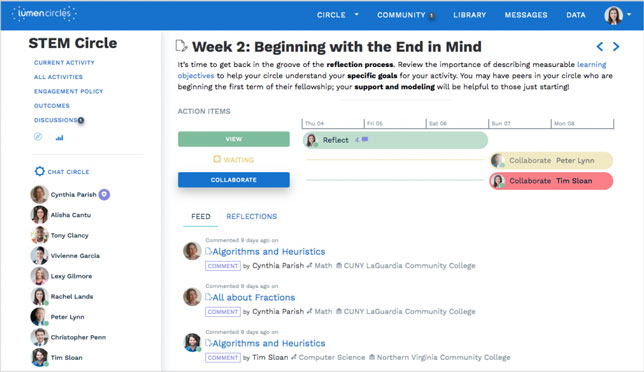Lumen Learning Intros Professional Development Program for Faculty

The Lumen Circles platform
A new professional development offering from Lumen Learning aims to help higher education faculty improve their teaching. Lumen Circles combines an online learning platform with "facilitated fellowships" that connect faculty with peers to form a virtual community of practice.
Faculty can choose from a variety of focus areas, such as online teaching, open educational resources and open pedagogy, active learning and more. They join a cohort of 10-12 peers with similar interests for a nine-week fellowship focused on "learning and applying effective teaching practice, sharing ideas, reflective teaching and feedback," according to the company. Participants have access to faculty mentors to "consult on pedagogy, learning design, evidence-based teaching practices," and upon completing the program receive a Lumen Circles Fellowship Certificate in Effective Teaching Practice.
"Higher education is in a period of unprecedented change with faculty members at the center of a forced transformation," said Kim Thanos, CEO of Lumen Learning, in a statement. "Our goal with Lumen Circles is to help faculty develop new skills to support their students' success and their institutions' outcomes in the face of changes that demand flexibility, resilience, and sensitivity to how learning happens."
"Overwhelming research evidence points to the fact that it's not enough simply to adopt a new textbook or learning tool," commented David Wiley, co-founder and chief academic officer of Lumen Learning. "If you want to improve student outcomes, you have to invest in faculty efforts to improve their teaching. They need more than an occasional webinar or lunch hour workshop. They need opportunities for sustained, evidence-based professional development that can help them become more capable and effective at supporting their students' success. Lumen Circles makes it possible to do this essential work affordably and at scale."
For more information, visit the Lumen Learning site.
About the Author
Rhea Kelly is editor in chief for Campus Technology, THE Journal, and Spaces4Learning. She can be reached at [email protected].